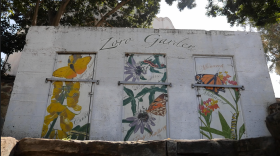San Diego planning officials are proposing new rules aimed at helping churches, synagogues, mosques and other faith communities build housing on their parking lots. The changes were pushed by a group of housing activists calling themselves YIGBY, for "Yes in God's Backyard."
City code currently requires houses of worship to maintain a certain number of parking spaces based on either pew space or square feet of assembly space. Those rules have complicated efforts by Clairemont Lutheran Church to build affordable housing on its parking lot.
The congregation floated the idea years ago, said Jonathan Doolittle, the church's senior pastor, but city staffers told him the parking spaces lost to the affordable housing would create a parking deficit for the church.
"(There was) a lot of rule-following and excuse-making for why this can't be done, not creative thinking as to how something new could get done," Doolittle said of his interactions with city staffers.
RELATED: ‘Yes In God’s Backyard’ Seeks Affordable Housing On Religious Land
Under the proposed change, places geared toward entertainment or public assembly, including churches, could build housing on their parking lots without falling out of compliance with the required parking minimums as long as the site is near public transit and the housing complies with all other zoning rules.
The proposal, along with a host of other updates to the city's land development code, is expected to go before the City Council's Land Use and Housing committee on Nov. 9.
Doolittle said the proposed change was exciting. He said the church's housing ambitions have taken a backseat to a renovation of its fellowship hall due to break ground later this year, but that the congregation planned on reviving the housing proposal in 2020.
"It's amazing to see how city government can be responsive to the greater community," he said. "I think the YIGBY movement has opened up their eyes and helped them to see that we're not going to go away."
The city is also proposing more technical changes to the city code that would allow for faster approval of new housing on pieces of land that are already partly developed. And it proposes lowering the overall parking requirements for churches and other entertainment- and assembly-oriented places.
RELATED: Report Says San Diego Needs $1.9B For Permanent Solutions To Homelessness
"This would help streamline the process, get the red tape out of the way and allow them to build affordable housing in these otherwise empty surface parking lots," said Brian Schoenfisch, a program manager in the city's Planning Department.
The YIGBY group formed after San Diego County Tax Collector Dan McAllister compiled a list of more than 1,100 properties zoned for religious use and handed it to associates involved in housing advocacy. The sites represent more than 2,000 acres of land across the county, much of it also zoned for housing.
The group says faith communities are an untapped resource for affordable housing because many have large parking lots that are needed for only a few hours a week and because they are driven by their faith's principles of charity and help for the poor.
"This is a welcome move and will assist these landowners in permitting and building greatly needed housing where there is a built-in support mechanism to care for the most vulnerable in the community," said Doug Austin, a local architect and member of the city's Planning Commission who is involved with the YIGBY group.







